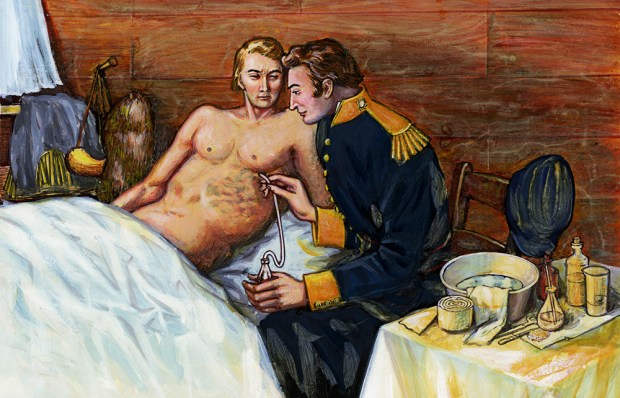Andrew Miller specialises in characters who are lost, often struggling to deal with the burden of failure. They don’t come much more adrift than Stephen Rose in The Slowworm’s Song, a former English soldier and alcoholic who is trying to start afresh with Maggie, a daughter he has barely met.
Miller plunges straight into this painful yet beautiful novel, opening with the bombshell that drives the narrative: a letter that has arrived with the return address Belfast BT2, and a street Stephen may have walked down 30 years earlier. It is from an organisation calling itself the Commission, signed by an Ambrose Carville, inviting Stephen to come to Belfast in October when they will be examining the events of the summer of 1982. ‘Ambrose? Is that an Irish name?’ Stephen, now 51, wonders.
There is a curiously hesitant feel to the opening pages, which are written in the first person. Stephen is telling his story, but being open is not something that comes easily. This is writing as confession, to his grown-up daughter. ‘I’m putting all this down on a pad in the library. I bought it in Smith’s – a 200-leaf student pad – and I’ve already made quite a dent in it,’ he tells her.
Out everything spills: how he joined up; how that decision hurt his Quaker father; how he lost himself to drink; how everything went wrong one Saturday morning in Ardoyne, a working-class Catholic area in north Belfast in 1982, when a young man – a tall lad, lightly built, rangy, with something small and dark in his right hand – ran out of a white door in a street of two-up, two-down houses.
‘I worried that this writing was unwise, that I was stirring things up I wouldn’t be able to control,’ Stephen frets, as he swirls between the present and back to his troubled twenties, which stretched into his thirties and forties.
He is torn about whether to go back to Belfast, bemused about the point of another inquiry so late in the day: ‘After 30 years the truth is either free already or lying on its back with its feet in the air.’
Miller is a wonderful storyteller, as comfortable writing about the Napoleonic wars as the Troubles. Other authors love him, and he deserves more readers. In this novel, Stephen’s reckoning may be extreme but his message is universal. ‘How fragile it all is, how we have nothing under our feet, nothing that can be depended on,’ he writes. Yet there can also be hope and redemption when you look hard enough.
Got something to add? Join the discussion and comment below.
Get 10 issues for just $10
Subscribe to The Spectator Australia today for the next 10 magazine issues, plus full online access, for just $10.
You might disagree with half of it, but you’ll enjoy reading all of it. Try your first month for free, then just $2 a week for the remainder of your first year.














Comments
Don't miss out
Join the conversation with other Spectator Australia readers. Subscribe to leave a comment.
SUBSCRIBEAlready a subscriber? Log in